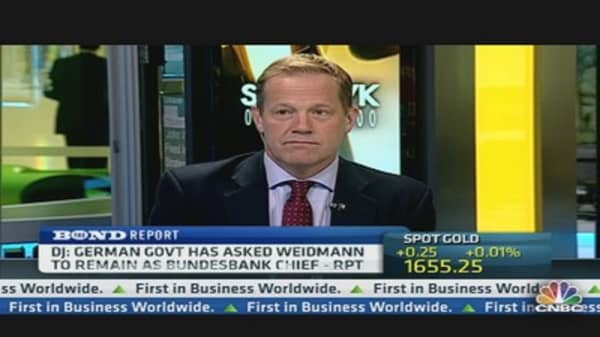A rumor that Bundesbank President Jens Weidmann, one of the most strident holdouts against a potential European Central Bank (ECB) bond-buying plan, might resign swept through European markets on Friday.
The rumor, which the German central bank declined to comment on, came after a German lawmaker from Chancellor Angela Merkel’s Christian Democratic Union party warned on Thursday that Weidmann might go. European markets rose slightly on Friday, led by a rally in Italian and Spanish markets, following the speculation.
If he did resign, he would be the third German ECB member to quit over monetary policy disagreements with the rest of the euro zone. His predecessor Axel Weber and former ECB chief economist Jürgen Stark left last year.
Weidmann has stepped up the war of words with the ECB in recent weeks as plans by the ECB to start mass bond-buying to shore up Spanish and Italian bond yields looked more likely to come to fruition. He warned earlier this week that the bond-buying could become "addictive like a drug."
Some in the markets are expecting an announcement as early as Thursday’s meeting of the bank’s policymakers.
The day after ECB President Draghi told German newspaper Die Zeit that the ECB could use “exceptional measures” within its mandate, Weidmann rebutted his comments and stated that government bond purchases would be “too close to state financing via the money press.”
“This underlines that there are still significant differences of opinion between national central bank governors and the wider ECB. In Germany’s case, the Bundesbank want to proceed as carefully as possible and this really illustrates that point,” John Wraith, fixed income strategist at Bank of America Merrill Lynch, told CNBC Friday.
“Everyone’s getting nervous about the ECB next week and how much detail we will get. We don’t think we’ll get much at this point. There’s clearly still differences of opinion.”
Barclays analysts argued that Weidmann’s resignation is unlikely.
“In the past at IMF meetings and elsewhere he has proven to be a tough negotiator and skilfully used the media to advance his positions. He is staunchly opposed to large-scale ECB interventions in European government bond markets,” they wrote in a research note.
A “compromise” between the Bundesbank and ECB is more likely, they believe – although this could be an unpleasant surprise for markets high on the hope of a huge, unconditional bond-buying program.
If Weidmann departs, his replacement may not be any more receptive to the ECB plan, as the resignation of his predecessor indicates. Germany’s fundamental case for caution still remains.
“Merkel is caught in the middle here as in so many other ways,” Wraith said. “As the strongest core country, Germany is the one who is being urged to make more sacrifices and go closer towards supporting the whole system, but because of their national self-interest they want to give away as little as possible.”
Another issue is that Spain and Italy, despite extensive doom-saying in the markets, have not yet requested a full bailoutfrom the troika of lenders which includes the ECB, the International Monetary Fund and the European Commission.
“The countries in question haven’t yet asked for official program assistance and that’s a prerequisite for the ECB to come in and make these purchases,” Wraith said.
Weidmann himself told German magazine Der Spiegel recently: “I can carry out my duty best if I remain in office. I want to work to make sure the euro stays as strong as the Deutsche mark was.”
Written by Catherine Boyle, CNBC. Twitter: @catboyle01





